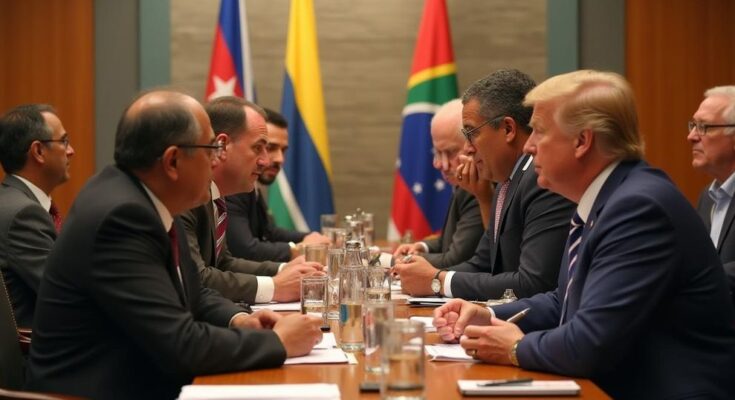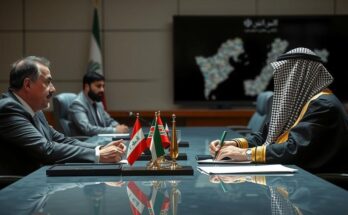At a recent meeting in Swakopmund, Namibia, Foreign Ministers Peya Mushelenga and Ronald Ozzy Lamola expressed support for Cuba and Venezuela, condemning US sanctions and addressing broader issues such as the bombing of Lebanon and sanctions against Zimbabwe. They also discussed the situation in Western Sahara, welcoming a ruling from the CJEU on self-determination rights.
During an official gathering held on October 14 and 15 in Swakopmund, Namibia, Foreign Ministers Peya Mushelenga of Namibia and Ronald Ozzy Lamola of South Africa jointly reaffirmed their support for Cuba and Venezuela, two Latin American nations grappling with severe economic challenges attributable to unilateral sanctions. The ministers specifically condemned the economic, financial, and commercial blockade against Cuba, instituted by the United States for over six decades, and appealed for its termination. In addition to discussing Cuba and Venezuela, the ministerial meeting addressed the bombing of Lebanon by Israel, denouncing it as a grave infringement on sovereignty and international humanitarian law. The ministers called upon the international community and the United Nations Security Council to reinforce adherence to international law in this context. Furthermore, both countries urged for the prompt and unconditional removal of sanctions levied against Zimbabwe, emphasizing that these measures detract from the socioeconomic progress of Zimbabwe and negatively impact the broader Southern African region. The ministers also focused on the situation in Western Sahara, welcoming the ruling of the Court of Justice of the European Union (CJEU) dated October 4, 2024, which highlighted the violation of the self-determination rights of the Western Sahara people by the European Commission.
The recent meeting of the Foreign Ministers of Namibia and South Africa highlights ongoing geopolitical issues surrounding economic sanctions, human rights, and international law compliance. Cuba faces a long-standing economic blockade from the US, while Venezuela also endures similar pressures. The support expressed by Namibia and South Africa reflects their larger commitments towards regional solidarity and opposition to what they deem unjust sanctions affecting sovereign nations. Moreover, the mention of Israel’s actions in Lebanon indicates the ministers’ concern for humanitarian standards and compliance with international law, which resonates within the framework of global diplomacy where nations advocate for the rights of oppressed peoples.
The meeting convened by Namibia and South Africa underscores a collective stance against unilateral sanctions impacting Cuba and Venezuela, inviting broader calls for international solidarity and human rights adherence. Furthermore, it reflects an interest in addressing regional issues, such as the impacts of sanctions on Zimbabwe and the situation in Western Sahara. The discussions emphasize the need for the international community to uphold principles of sovereignty and self-determination.
Original Source: www.plenglish.com




